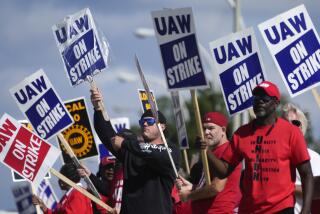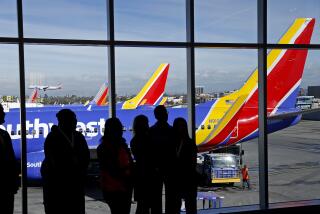Unions See Dangers in Leveraged Buyouts of Airlines
- Share via
WASHINGTON — Labor leaders told a House subcommittee Tuesday that increased foreign investment in U.S. airlines and the heavily leveraged buyouts of air carriers threaten the safety of passengers and the soundness of the air industry.
Leaders of two major unions representing more than 90,000 airline employees told the House subcommittee on aviation that leveraged buyouts could force airlines to cut costs, and thereby, corners.
“Leveraged buyouts represent a tremendous problem for the flying public and for the airline employees we represent,” said William Genoese, director of the airline division of the International Brotherhood of Teamsters.
Urges Ownership Limits
“They do not create jobs or improve service to the public. Instead, they often mean substandard wages, inadequate training and short cuts that affect safety,” he said.
Genoese also said foreign ownership should be strictly limited. Federal law now allows foreign companies to own as much as 25% of a U.S. airline.
The subcommittee is examining the effects highly leveraged acquisitions and increasing foreign investment could have on the U.S. airline industry.
Last week, Transportation Secretary Samuel K. Skinner ordered Northwest Airlines to reduce to $175 million from $400 million the investment KLM Royal Dutch Airlines had in the airline.
The proposed employee-management buyout of UAL Corp., parent of United Airlines, includes an investment of $750 million from British Airways and is presently under review by the Transportation Department.
Aside from heavy foreign investment, both transactions were heavily leveraged and increased substantially the amount of debt carried by the airlines.
Transaction Could Backfire
An analysis by the General Accounting Office indicates that Northwest had long-term debt of $385 million before its acquisition but had debt of $3.1 billion after the deal.
United would face a debt load of $7 billion following its acquisition, compared to $2.6 billion now, the analysis said.
In a leveraged buyout, an acquiring group buys out existing shareholders of the company to be acquired and finances the purchase by selling assets or by having the acquired company borrow money to pay for the shares, thereby taking on new debt.
This type of transaction could backfire in a recession, which could render the acquired company unable to repay its debt without dismantling its operations.
Legislation is pending that would block the acquisition of an airline unless the secretary of Transportation finds that the transaction would not cause the carrier’s debt-to-equity ratio to increase to a level greater than one-to-one.
John J. Kerrigan, director of the air transport division of the Transport Workers Union of America, told the subcommittee that leveraged buyouts also can bring plenty of turbulence to management-labor relations, citing the example of the acquisition of Eastern Airlines by Texas Air Corp.
“In essence, Texas Air took the cost savings realized from the sacrifice of pilots and flight attendants and used them to fund the installation of one of the most aggressive anti-worker managements we have ever dealt with,” he said.
Kerrigan said the government also should be as concerned with the access of foreign maintenance workers to U.S. aircraft as it is about foreign ownership of the airlines.
More to Read
Inside the business of entertainment
The Wide Shot brings you news, analysis and insights on everything from streaming wars to production — and what it all means for the future.
You may occasionally receive promotional content from the Los Angeles Times.










